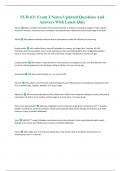NUR 631 Exam 2 Neuro Updated Questions And
Answers With Latest Quiz
Seizure ANS Is a sudden involuntary, time limited alteration in behavior, including a change in motor activity,
autonomic function, consciousness, or sensation, accompanied by an abnormal electrical discharge in the brain.
Partial ANS patients resemble someone who is intoxicated or under the influence of some drug
Simple partial ANS cerebral lesion, cause NO alteration in memory, no longer than 1 minute, NO LOC.
Twitching, abnormal sensation, vision, smell, paresthesia, they have flashing lights, hear things/hallucinations,
starts in one muscle group extends into one side of the body. Younger individuals (3-15 years of age)
Complex partial ANS simple + impaired level of consciousness, can progress to LOC, aura they feel then they
can have a staring appearance, lip smacking, picking at clothes. Can occur at any age.
Generalized ANS have a warning sign (i.e., cry, scream, fall)
Absence ANS sudden arrest of motor activity followed by eye lid fluttering or head nodding. Impaired LOC (not
loss, in awake state). Typically, between 3-15 years of age.
Myoclonic ANS momentarily/impaired LOC, awake state. Motor root involvement lasting a minute, brief jerking
contractions of limb or trunk, hard to control, progress to tonic clonic. 2-7 years of age
Tonic-clonic (generalized): ANS aura, repetitive muscle movements (rigid jerky movements), LOC**, bowel &
bladder incontinence, post-ictal confusion. Onset varies (typically adult onset), etiology: brain tumor, post head
trauma or injury, or alcohol withdrawal
Tonic ANS LOC**, bowel & bladder incontinence, post-ictal confusion. Onset varies (typically adult onset),
etiology: brain tumor, post head trauma or injury, or alcohol withdrawal
Atonic ANS sudden loss of muscle tone (head drop, drop of limb, drop to the floor), impaired form of
consciousness lasts 1-2 seconds.
, What is the Difference between convulsion & epilepsy? ANS Epilepsy is a chronic neurologic condition.
Convulsions can be a reaction to a single medical event or a part of a medical condition.
Status Epilepticus ANS Series of grand-mal seizures that lasts >10 minutes. Awake or asleep, do not regain
consciousness during the attack in any form. MOST SEVERE/ LIFE THREATENING BECAUSE LEADS TO RESPIRATORY
FAILURE OR DEATH. MEDICAL EMERGENCY!!
Etiology for Seizures ANS - A-alcohol (main cause)
- E- electrolytes, encephalopathy, endocrine
- I- infection
- O- overdose, oxygen deficiency
- U- Uremia
- T- Trauma or tumor
- I- insulin
- P-psychogenic, poisons
- S-stroke, shock
The most definitive way to diagnose a seizure is through an ANS EEG
PNES (psychogenic non-epileptic seizures) / AKA psuedoseizures ANS Characterized by sudden and time limited
disturbances of motor sensory autonomic cognitive and emotional state that can mimic an epileptic seizure. In
contrast, not associated with excessive neuronal activity it's related to psychological occurrence or disturbance.
What is the main goal in the management of seizures? ANS Main goal is to prevent recurrence of seizure and
decrease side effects from drugs
When should a pt. be referred to a neurologist ? ANS for therapy initiation
What is the main side effect of ALL epilepsy drugs ? ANS Somnolence/Sedation
Klonopin (Clonazepam) drug levels ANS Therapeutic level 20-80




